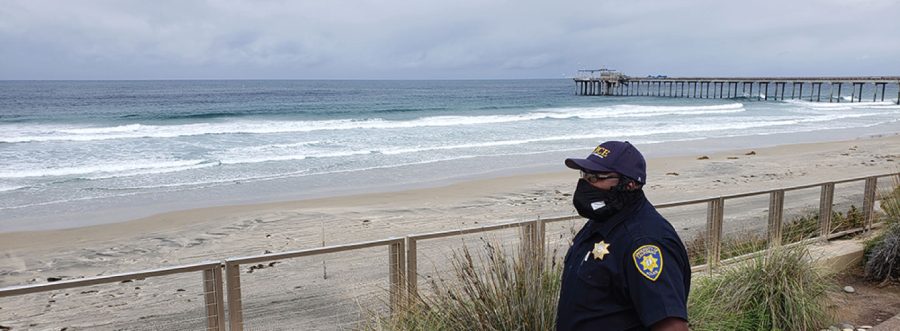In the wake of the Black Lives Matter and #MeToo movements, there have been greater calls for better police accountability for using brute force and ignoring or covering up sexual assault cases. The UCSD Guardian examines changes that have been made to University of California Police Department policy as well as the San Diego Police force.
UC San Diego students and staff have proven to be very vocal about BLM and police accountability on campus. On June 6, 2020, demonstrators made a protest caravan down La Jolla Village Drive towards Gliderport, chanting the names of Black individuals murdered by police.
In February 2021, the UC system arranged plans to fund a Systemwide Response Team (SRT). Under this policy, officers would be allowed to turn off their body cameras when it “would jeopardize their safety or the safety of the public,” which changes the definition of a police force, among other things listed. These plans were met with significant backlash, particularly from the UC San Diego Cops Off Campus Coalition, or UCSD FTP.
UCSD FTP affiliate and Professor of Literature Sal Nicolazzo noted concern back in May 2021 that this policy funded weapons and gear that took away resources from addressing student needs.
“If the response is, ‘let’s arm more officers with pepper spray,’ it seems like the real goal is to prevent student protests against things like tuition hikes,” Nicolazzo said. “[The SRT] is obviously going to increase the budget, scope, and militarization of campus police, when instead we could be asking how we can foundationally rethink what safety looks like on our campuses.”
When asked about the actions UCSD is taking to encourage more police accountability, Associate Director of University Communications Leslie Sepuka told the Guardian that the university will continue changing to best suit the needs of students by using data to help shape its policies.
“The police department continues to evolve and respond to best practices and the needs of the community,” Sepuka said. “Going forward, accountability and transparency will be supported by new channels for sharing feedback and data — such as the publication of data on use of force incidents and community complaints — in order to track progress, answer timely questions and continually improve.”
In October 2021, The Guardian highlighted James Steve’s lawsuit against UCSD and Regents.
Steve’s lawsuit, filed on July 23, 2021, alleges that there were systematically-reinforced issues of racism, sexism, and homophobia within the UCSD-PD force. It claims that his time in the force led to loss of financial stability and security, and had a detrimental effect on his mental health.
The Guardian reached out to Steve’s representing attorney, Darren Richie, for a possible update on the trial. However, Richie and other attorneys of DreLaw neglected to respond.
Similar news has followed from UC Santa Barbara. Since 2019, seven lawsuits have been filed from former and current officers in the UCSB’s branch of UCPD. The officers filing these lawsuits include Michael and Tiffany Little, Mark Signa, Jonathan Lee Reyes, Matthew Stern, Amanda Siegel, and Ryan Smith (who filed a lawsuit under the pseudonym John Doe). Some of the lawsuits suggest that officers have engaged in inappropriate relationships with students, such as providing underaged students with alcohol. Additionally, these lawsuits alleged many incidents where officers dismissed cases of sexual assault and harassment. Stern and Michael and Tiffany Little stated that they were demoted after they reported offending officers.
According to the Daily Nexus, “after reporting several instances of harassment, [Stern] resigned after being told by UCPD Chief James Brock that she had become a ‘target’ within the department.”
Nearly all of these cases were filed against the UCPD under allegations that the officers violated the California Whistleblower Protection Act — an act that prohibits employers from retaliating against employees who report violations of the law. The suits allege that the officers were faced with retaliation from other members of the force when they attempted to speak up. For instance, Signa’s lawsuit claims that an anonymous male caller warned his wife in September 2018, “Sorry, wrong number. Tell Mark Signa to watch out,” allegedly in response to his whistleblowing.
It has not only been officers who have filed lawsuits against the UCPD. On July 31, 2020, a student going by the name Emily O. filed a lawsuit against the UCSB-PD Chief of Force James Brock. She alleged that Brock assaulted her in August 2019.
“I hope UCSB will enforce measures to better protect their students,” Emily O. told the Daily Nexus. “I just want to make sure this doesn’t happen to anyone again because this has been the worst thing I’ve ever had to go through.”
To address rising concerns about campus police, the UC system introduced the UC Community Safety Plan in August 2021.
The UC Community Safety Plan outlines guidelines for campus safety in the future. The plan claims that the campus safety system will provide monitored high-quality service and the hiring process will include participation from various student, faculty, and staff groups. The plan also says that a tiered system will match a call with the appropriate service, ranging from mental health to emergencies and more.
Moreover, the plan states that there will be a greater emphasis on deterrence and violent crime prevention over punishing minor crimes, that there will be a reduction of police at protests, and focus on de-escalation instead. Most importantly, the new guidelines state that data collection will be used to assess these campus practices, and there will be new boards and positions to help ensure safety and improvement.
Sepuka states that this plan is to help make the UC universities feel more open, safe, and welcoming to all students.
“These guidelines focus on community and service-driven safety, holistic, inclusive and tiered response services, transparency and continuous improvement through data and accountability and independent oversight,” Sepuka said.
Outside of the UC system, San Diego has clear issues with policing, such as race disparity. A report by Accountable Now released on Dec. 23, 2021, stated that San Diego reported 15,018 uses of force by the police. Even though Black people comprise 6 percent of the population, they made up 24 percent of the reports of force. Hispanic people, who make up about 30 percent of the population, comprise 27 percent of the reports of force.
Accountable Now is a policing report created at The Leadership Conference Education Fund. It collects data from law enforcement agencies, community members, activists, and public records and shares it publicly.
To address the policing issues that these statistics bring awareness to, Councilmember Joe LaCava told the Guardian that San Diego is not at where it needs to be to fully address them.
“The good news is that San Diego has already taken the first step to reforming our approach – acknowledging that it must change,” Councilmember LaCava explained. “However, we still have a long way to go to effectively prioritize accountability and transparency while continuing to respect those who serve and risk their lives for public safety.”
Since 2020, the San Diego government has been implementing different measures to encourage accountability and to track public opinion on policing. On Nov. 1, 2021, the San Diego police department launched an anonymous survey to get citizen input on policing in response to major local criticism. This was notable as this launch followed the release of a recording of San Diego officers forcibly beating Jesse Evans, who is a homeless Black member of the La Jolla community on May 14, 2021. Additionally, on April 26, 2021, the San Diego City Council voted unanimously to create an independent police oversight commission.
“I have great hope that a more sophisticated approach will bring back greater levels of accountability,” LaCava added about the Commission.
The Guardian will continue to monitor the situation in San Diego. Those interested in filing a complaint with the San Diego police department can do so at the link here. Those interested in filing a complaint with the UCSD police department can do so here.
Photo courtesy of the UC San Diego Police Department.
This article was updated on Jan. 18, 2022, at 6:35PM to provide further information on Councilmember LaCava’s position.
















